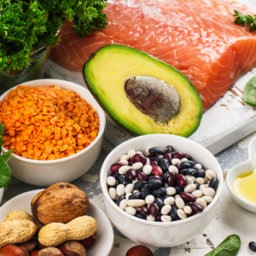
Protein is an essential part of any healthy diet. Not only does it serve several important functions of the body, including repairing muscle tissue and producing enzymes, but it also promotes healthy eating habits by helping to control hunger. If you struggle to get enough protein in your diet, you’re not alone. Luckily, there are many foods you can find at any grocery store that are excellent protein sources. What’s more, the high-protein foods listed below are highly affordable, so you can reach that daily protein goal without blowing your budget.
1. EGGS
Eggs are considered a complete protein and are very inexpensive. A single egg contains approximately seven grams of protein and only 70 calories. Since eggs are much quicker and easier to cook than most types of meat, they’re a great way for busy individuals to get in their daily protein goal.
2. FARRO
Farro is a lesser-known type of whole grain that’s versatile, delicious and protein-dense. Just one serving of farro has around seven grams of protein, making it a great alternative to other grains when you need a protein boost. Toss some farro over a salad, mix it with some sauteed veggies or enjoy it as a side dish with a drizzle of olive oil and dash of salt.
3. GROUND TURKEY
Turkey is quite lean and affordable, making it a fantastic alternative to pricier, fattier types of meat. One serving of ground turkey contains over 20 grams of protein and, like all meat, is a complete protein. Ground turkey can be made into burgers, meatballs or even mixed with pasta sauce.
4. BEANS
Beans are one of the least expensive foods around—a pound of dry beans can often be purchased for under one dollar. Beans are low in fat, high in fiber and one serving typically contains around seven grams of protein. Pair beans with rice and veggies for a hearty, balanced meal.
5. TUNA
In terms of fish, canned tuna is a very cheap and reasonably priced source of protein with nearly 30 grams of protein per can of tuna. Along with the high levels of protein, canned tuna also has little amounts of fat along with other health benefits such as omega-3 fatty acids and vitamin D. It does contain trace amounts of mercury, however if we try to limit our canned tuna intake to about two to three times a week, it is a fantastic source of protein and other nutrients that won’t break the bank!















